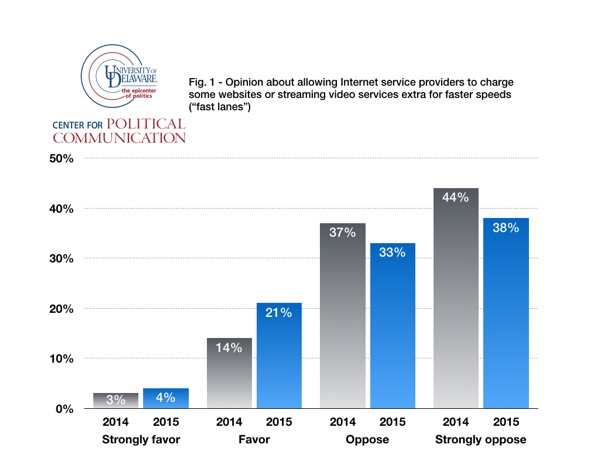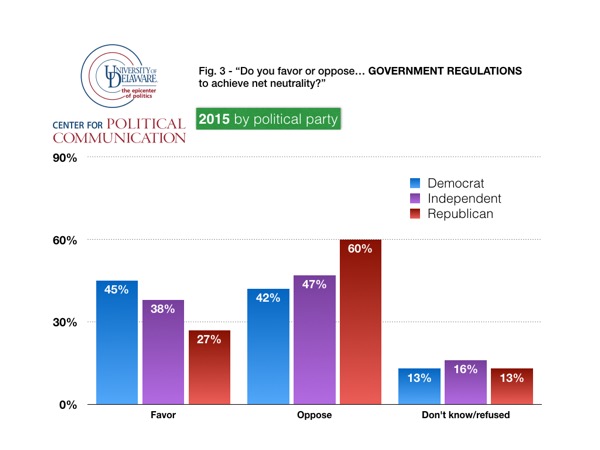


Internet opinions
National survey shows public still opposes Internet 'fast lanes' but resists government regulation
1:04 p.m., Dec. 14, 2015--As a federal court considers new national rules on Internet service, a new study by the University of Delaware’s Center for Political Communication shows most people still oppose Internet “fast lanes.” But the study also shows Americans are reluctant to give the federal government power to regulate “net neutrality.”
The study shows that a large majority of people surveyed still oppose Internet fast lanes (71 percent). Opposition is down from a similar survey one year ago (81 percent), when President Barack Obama announced his support for new net neutrality rules. Such rules would restrict Internet providers from offering “fast lanes” in the form of premium service to web streaming operations such as Netflix, Hulu and Amazon.
Research Stories
Chronic wounds
Prof. Heck's legacy
The UD survey reveals a new partisan divide on the net neutrality issue between Republicans and Democrats, with Republicans more likely to favor allowing Internet service providers to charge extra for premium speeds. In 2014, opposition to fast lanes did not differ significantly by political party.
Lindsay Hoffman, the center’s associate director, observed that in just one year, public opinion about this previously low profile issue has become politically polarized. “When political leaders like President Obama and senator and presidential candidate Ted Cruz, who called net neutrality ‘Obamacare for the Internet,’ take a position on an issue like this, it becomes politicized for the public.”
Paul Brewer, the center’s director, pointed out that research on the net neutrality issue is quite new, and the 2015 survey shows that public responses on this issue depend on how the question is asked. “When respondents are asked about ‘government regulation’ to achieve net neutrality, 48 percent are opposed,” Brewer said. “There’s a disconnect here; most Americans oppose Internet fast lanes, but nearly half also oppose government regulations to accomplish that goal.”
The Federal Communications Commission is defending its Internet service regulations in court against industry challengers who argue that the FCC has no power to regulate Internet service as it has telephone and television in the past.
The FCC rules were imposed last June, to keep Internet providers such as Verizon and Comcast from blocking or slowing web access to some users, and selling premium Internet privileges to others.
“The study also shows a modest increase in how much people have heard about the issue since last year.” said Brewer.
The telephone survey of 901 U.S. adults was conducted by the University of Delaware’s Center for Political Communication from Nov. 11-17, 2015. CPC Director Paul Brewer supervised the study.
Full details of the study are available at the center's website.
About the study
The National Agenda Opinion Project research was funded by the University of Delaware’s Center for Political Communication (CPC) and the William P. Frank Foundation. The study was supervised by the center’s director, Paul Brewer, a professor in the departments of Communication and Political Science and International Relations.
Results are based on telephone interviews with a representative sample of 901 adult U.S. residents. Telephone interviews were conducted via landline (n=344) and cell phone (n=557). The survey was conducted under supervision of the Center for Political Communication by Princeton Survey Research Associates International, and the interviews were administered in English by Princeton Data Source. The data were collected from Nov. 11-17, 2015. Statistical results are weighted to correct known demographic discrepancies. The margin of sampling error for the complete set of weighted data is ± 3.2 percentage points.
Readers should be aware that in addition to sampling error, question wording and practical difficulties in conducting surveys can introduce error or bias into the findings of public opinion polls.
Contact Paul Brewer at 302-831-7771 for more details about the survey’s methodology.










